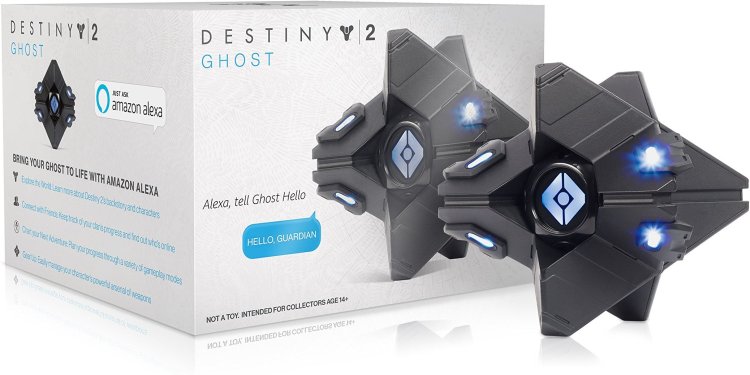As a longtime Destiny player, I’ve occasionally found myself wishing for the companionship of one of the game’s Ghosts — floating robots that offer commentary, guidance, and the occasional wisecrack, along with persistent resurrection. Bungie, the online shooter’s studio, set out to offer players something like this (minus the functional immortality) with a limited edition Ghost speaker that pairs with a skill for Amazon’s Alexa virtual assistant to provide voice-activated help while they’re playing Destiny 2.
It’s a solid pitch, especially since Destiny 2 is the sort of game that benefits from third-party management software. But what actually shows up in the physical package that users purchased (it was a limited edition that has sold out) is so underwhelming that I worry about what it means for the future of virtual assistants like Alexa.
While I was expecting the Ghost to be a complete Alexa-enabled speaker that could stand on its own, it turns out Amazon delivered the exact opposite. It requires a dedicated power outlet and a connection to the internet, like an Echo, Echo Dot, or similar smart speaker, but the device’s sole use is to act as an output conduit for the portions of the Destiny 2 Ghost Alexa skill that are voiced by Nolan North, who also provides the robot’s in-game voice.
Setting up the Ghost requires plugging it in, connecting to its dedicated Wi-Fi network, providing it with a password for an internet-connected network, installing the Destiny 2 Ghost Alexa Skill on your existing Echo device, then reciting the serial number on the back of the Ghost to the Echo to finish activation.
After that song and dance, you can then ask Alexa to “ask Ghost what’s next” and listen to North’s filtered voice rattle off a list of possible options for in-game activities through the tinny speaker of your new Ghost. Oh, and it lights up while he talks, so that’s something.
As I stared into the unblinking, glowing eye of the Ghost sitting on my coffee table, I had a horrifying vision: homes stuffed to the gills with unitasking tchotchkes surrounding virtual assistant speakers in different rooms. Each of these plastic gizmos opt to chime in only when users speak the correct incantations, and otherwise sit around dumbly, sucking up power and waiting for their moment in the spotlight.
Gamers certainly aren’t averse to shelling out money for doodads that provide virtual benefits — see the continuing success of Nintendo’s Amiibo figurines — but the Ghost is something different. It calls for persistent access to a power outlet, plus a treasured place within earshot of a gaming console and an Echo device.
The novelty of asking the Ghost to equip different user-specified load outs wore out fast, too. Sure, it was nifty to ask for the Ghost to equip my best rocket launcher and actually see the item show up in my character’s inventory, but it’s not that much more special than using one of the existing companion applications that tap into the same Destiny 2 API for inventory management.
Not only that, but North’s voice sounded better coming out of my Echo Dot than it did coming out of the Ghost’s speaker. If this was some $20 doodad, that wouldn’t sting as much, but the Ghost costs $90, three times the price of an Echo Dot.
If this is the future of Alexa and its fellow virtual assistants, that’s bad news for the rest of us.

